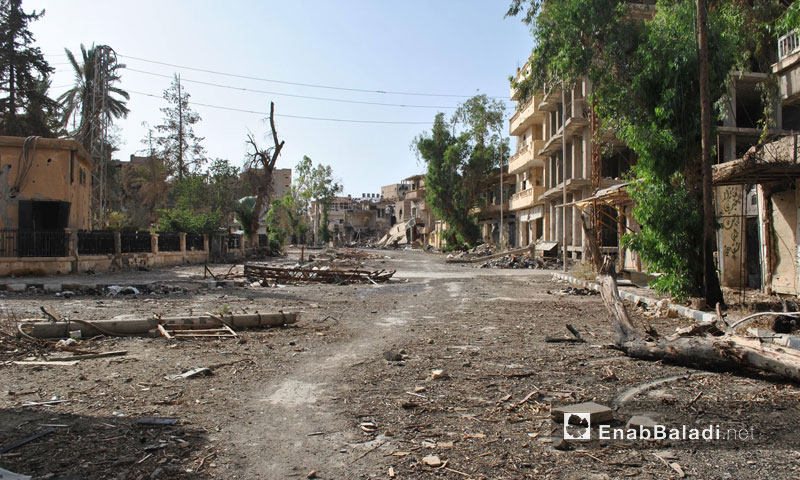



In helicopters, the Syrian regime’s affiliate delegations take turns in visiting Deir ez-Zor. This, however, fails to hide the reality of the accumulative challenges and the difficulty to live in the city, which triggered some people to dismiss the idea of a return in the present and pushed others to sell their properties and their residential and agricultural real-estates within a new widely prevailing phenomenon.
“Until we return, there is no water, nor electricity and not even security,” said Um Muhanad, a 46 years old woman from the city of Deir ez-Zor, who in her interview with Enab Baladi explains that her house is almost entirely destroyed, so she sold it as a piece of land, after she settled down with her family in the city of Damascus. “I know that the price would not be just, and that it is not a good time to sell, but I am obliged,” she added.
The capital’s “extravagant” lifestyle and the exaggerate daily and her children’s studying expenses forced Um Muhannad to sell the house, pointing out that her four brothers have also sold their houses and settled down in different places.
The woman does not consider the selling and buying of lands and real-estates in Deir ez-Zor as wrong, despite the exceptional conditions that the city is enduring. War is thus, but life has to keep going, and we need every single penny,” she says, hinting at a “financial crisis” which most of the people are suffering, one that prevented them from freezing their money as lands or properties, preferring to utilize them, even if they were to be sold for little returns.
“Agricultural lands and partially destroyed residential properties attract investors,” says Abu Hassan, a 56 years old man who works as a real-estates broker in Deir ez-Zor, telling Enab Baladi about the nature of his work, “I facilitate the selling and buying processes as a mediator; I provide the legal documents and supervise the selling transactions.”
The broker points out that the real-estate market has witnessed a marked activity, after Assad’s forces had control over the whole city at the end of the last year. “The monetary motion has positively affected the markets, especially that it enabled the two parties to the contract through providing the buyer with liquidity and hastened the building proceedings via financially capable merchants who helped in investing in these assets.”
Abu Hassan speaks of the reconstruction of the city, denying the accusations that targeted him and other brokers for exploiting the current situation. “Even though the war has caused a massive deterioration in the prices of real-estates, this are the market’s rules,” he said, relating the prices to the market’s activity, which constantly undergo changes in the light of supply and demand.
He assures that “the declining real-estate prices did not restrict the market’s activity, which is witnessing an increasing demand on the part of buyers,” who perceive it as a chance to invest their money and expand their properties, as he put it, hoping that this will inspire rapid progress in economy by opening a wide space for contracting works, activating the labor market and limiting unemployment.
Teacher Abu Omar, a 49 years old man, describes the situation in the city as “the most heinous forms of exploitation,” speaking of selling houses, the worth of which corresponds to millions, for prices that are 30% less than their real value. “Many merchants, owners, and authoritative figures, in the State and the security units, take advantage to expand their properties, and to confiscate large areas of lands and real-estate for the lowest prices ever.”
“What connects us to the city is more than stones, which can be sold and get done with. There lies our lives, memories and ties that we cannot facture, no matter how hard we try,” says Nihal Mohammad, a 48 years old woman, who left her city of Deir ez-Zor six years ago, to take refuge in the Turkish city of Urfa, where she today lives along with her family.
Nihal refuses to sell her house in the city and tells Enab Baladi, “We do not have the right to blame anyone for selling his/her property, but we must try to hold own to our belongings to the last moment.”
She admits that people are denied the ability to benefit from or invest their properties for being far away, especially with the difficult legislative proceedings. However, what worries her the most manifests in the potential of the assets and lands gathering in the hands of a small group, which own both money and authority.
The majority of Deir ez-Zor city’s neighborhoods are either partially or entirely destroyed, and most of the people are concentrated in the neighborhoods of al – Qosoor, al-Joura, Harabesh, while other seven large neighborhoods are almost empty of residents in the meantime, according to the city’s people.
Prior to 2012, the population of the city of Deir ez-Zor reached 400 thousand persons, according to activists’ estimations. However, it declined to reach 15 thousand persons today, after the displacement of thousands of people in the past a few years, even through the city has witnessed the return of a sufficient portion of people in the past months period, following Assad’s forces control over the city.
if you think the article contain wrong information or you have additional details Send Correction